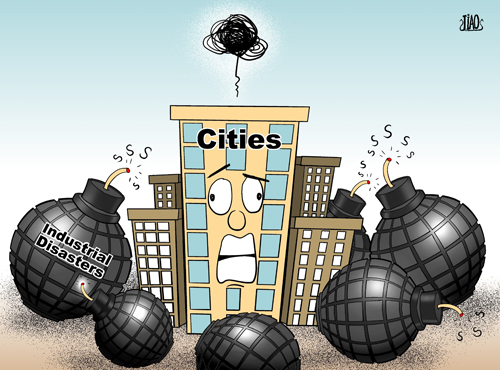Will a heart transplant save smog-ridden Beijing?
- By Geoffrey Murray
 0 Comment(s)
0 Comment(s) Print
Print E-mail
China.org.cn, December 15, 2011
E-mail
China.org.cn, December 15, 2011
Recent high pollution levels in Beijing, provoking widespread public demands for drastic action to deal with this health threat, once again focuses attention on whether it's time to create a new Chinese capital somewhere else - even though the weight of history and culture seems against it.
|
|
|
Ticking timebombs [By Jiao Haiyang/China.org.cn] |
In China, the relocation issue surfaces whenever urban maladies like toxic air quality, traffic congestion and occasional gridlock, plus long daily commutes for 20 million people provoke unhappiness.
After an appalling dust storm (a traditional Spring hazard until recently) in 2006, members of the National People's Congress even tabled a motion, saying: "The ecological environment in North China is on the verge of collapse. We suggest: move the political capital out of Beijing into the central plains or the South [where it has been before]."
But, where to go? One can imagine the dogfight between different regions, and there has certainly been no shortage of vocal candidates in central, west and south China; each candidate city would be inundated with migrants hoping to get an early place on the expected "gravy train".
Shen Hanyan, a Shanghai-based scholar, has suggested moving to the national geographical heart to provide gravitational pull bringing about a fundamental change in distribution of wealth and productive forces; not mere taking over and expanding an existing small or medium-sized town, but a new urban entity created from scratch.
His idea was misinterpreted as a scheme to cure Beijing's traffic indigestion, and critics quickly pointed out that, regardless of where the capital moved the traffic problem would go with it. Agreed; but that wasn't his point.
The real issue is the current economic pattern of "a very strong east and a very weak west," where the coastal regions have become overdeveloped and bloated while the far-flung regions of central and western China still have a lean and mean look despite government efforts to promote wider development.






